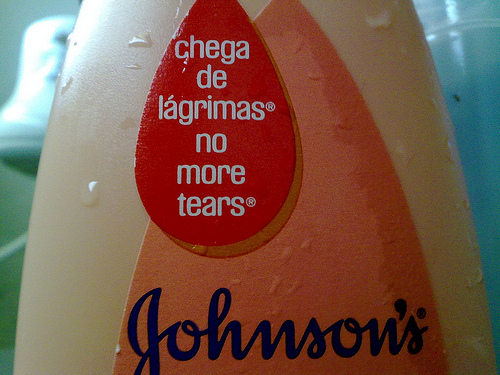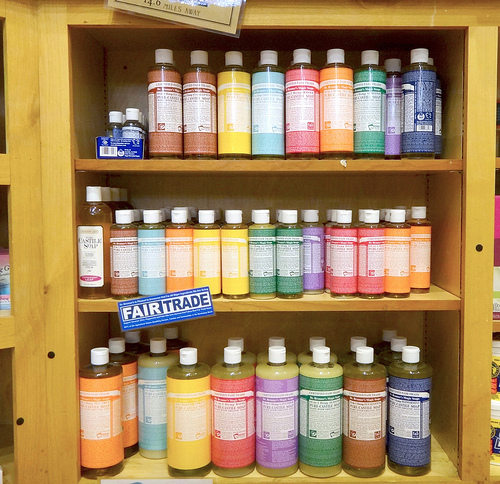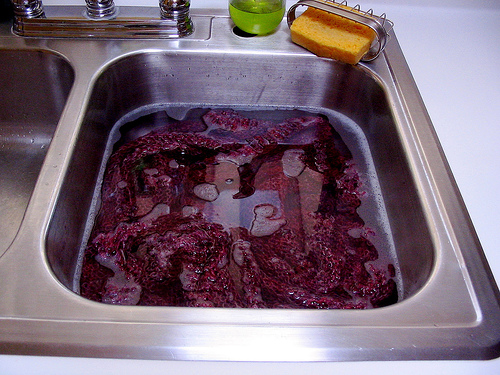What should you use to wash your knitting?
When it comes to the topic of washing your knitting, opinions are as varied as they are entrenched. One person will tell you to use X and never anything but X and certainly never Y. While the next person will swear that they only use Y and would never dream of using X. Personally, I have tried just about everything, and I don't think it matters as much as most people seem to think. It all comes down to individual preference.
Woolite
Pro: It says "wool" right in the name, and is marketed as a detergent specifically for hand-washing woolens.
Con: Woolite detractors say it's too harsh. I haven't found that to be the case. But I have found that it is crazy expensive compared to the alternatives.
Shampoo
Pro: Wool is basically just like your hair, except it comes from a sheep and not a person's scalp. Thus, you should treat it just like your own hair, and wash it with shampoo. I don't know about that, but I do know that you can find shampoo cheap, and you always have it around in a pinch (as when traveling).
Con: I don't know about the logic behind it. Shampoo actually isn't all that great for your hair, and it can have a lot of weird ingredients like waxes and oils that you might not want on your knitting.

Image courtesy Flickr/georgyk
Baby Shampoo
Pro: A lot of people seem to be under the impression that baby shampoo is more gentle than regular shampoo. This is not the case. The only difference between them is that baby shampoo is formulated to not be stinging to the eyes. In every other respect, it's pretty much the same.
Con: I don't personally like the smell of baby shampoo, even the unscented kind. And it's more expensive than a bottle of regular old Suave shampoo. But whatever.
No-Rinse Wool Wash
Pro: Products like Soak and Eucalan offer all the cleaning without all the annoying rinsing. This is great for large and/or bulky knits that are a pain to rinse properly, and for super-delicate projects (like Shetland lace) that might felt if you're not extra careful.
Con: The smell often lingers longer than with other products. They are quite expensive and can be difficult to find for sale, compared to your other choices. And for genuinely dirty items like a heavily-worn sweater or scarf, I don't feel like they get as clean without a full rinse cycle.

Image courtesy Flickr/elycefeliz
Liquid Dishwashing Detergent (e.g. Dawn)
Pro: You probably already have some. And this is a great product to use on a work that's greasy, either because of a tragic mishap or due to yarn with lots of lanolin or machine oil.
Con: Can be very harsh on delicate fibers, causing them to felt and shed faster than they ordinarily would have. The leftover smell from some liquid dish detergents can be strong.
Dr. Bronner's Liquid Soap
Pro: Ecologically sound, organic and awesome. Comes in great smells that don't linger too strongly after the piece dries. Affordable, because you only need a few drops of the concentrated liquid per wash basin.
Con: I don't feel like it works as well in colder water. I know the package says it does, but I get weirded out by the way it separates and forms a strange milky film at the top of the bowl. In my experience, doesn't do a great job on greasy problems. Can be more difficult to find, for those without access to high-end grocery stores or hippie food co-ops.

Image courtesy Flickr/Nick Sherman
Laundry Detergent
Pro: You probably already have some. Performs very well in cold water. Often requires a lot less rinsing than some of the other alternatives. This is what I personally use most often.
Con: Depending on your preferred brand, might leave an undesirable film of "softener" or fragrance behind on your knitting.
Borax
Pro: Affordable, and a great addition to your regular laundry detergent as well. Particularly useful at getting out bad smells and stains. Can be added to any of the above detergents, to provide a little extra boost of cleaning power.
Con: Storing a powder can be difficult in humid climates. I keep mine in a big Tupperware container to keep the moisture out. Can be hard to find, although many stores carry it in the laundry detergent aisle. Many people are needlessly afraid of borax, which is used as a food additive in many countries. You're probably thinking of boric acid which is used to kill ants.
Main image courtesy Flickr/adamknits
